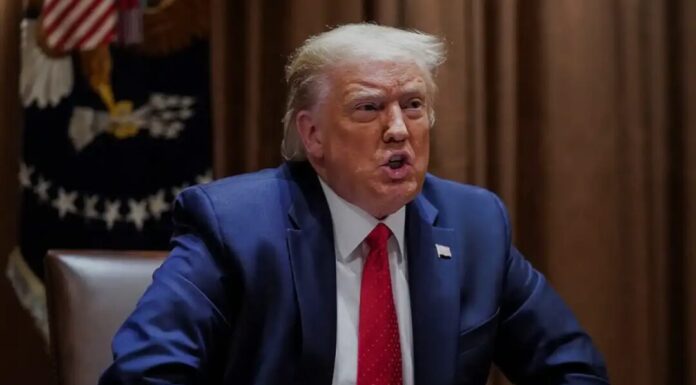
Donald Trump has petitioned the US Supreme Court to overturn a lower court decision that deemed most of his sweeping trade tariffs unlawful.
The US president filed the petition on Wednesday, challenging a federal appeals court ruling in Washington DC that centered on his “liberation day” border taxes.
These taxes imposed levies of between 10% and 50% on most US imports, sending shockwaves through global trade and markets.
The court found in a 7-4 ruling last Friday that Trump overstepped his presidential powers when he invoked a 1977 law designed to address national emergencies to justify his “reciprocal” tariffs.
Although the decision was a significant blow to Trump’s tariff policies, the levies were left in place until October 14, giving the administration time to ask the Supreme Court to review the decision.
Trump has now appealed, and the Supreme Court is expected to review the case, although the justices must still agree to do so. The administration has requested that the decision be made by September 10.
The appeal calls for an accelerated schedule, with arguments being heard by November 10, according to filings seen by Bloomberg. Justices could then rule by the end of the year.
The ruling that the tariffs were unlawful upheld a previous decision by the US Court of International Trade.
The federal appeals court stated that US law “bestows significant authority on the president to undertake a number of actions in response to a declared national emergency, but none of these actions explicitly include the power to impose tariffs, duties or the like, or the power to tax”.

Many of Trump’s steep tariffs were deemed “unbounded in scope, amount, and duration” and “assert an expansive authority that is beyond the express limitations” of the law his administration relied on.
Trump swiftly responded to the court’s decision, stating, “If allowed to stand, this Decision would literally destroy the United States of America,” on his Truth Social platform.
On Tuesday, he called for an “expedited ruling” from the Supreme Court, claiming that the US “could end up being a third-world country” without tariffs.
A defeat for Trump’s levies would significantly impact the US economy. According to Chris Kennedy, an analyst at Bloomberg Economics, it would at least halve the current average US effective tariff rate of 16.3% and could force the US to pay back tens of billions of dollars. Preliminary trade deals with countries like the UK and the EU might also be derailed.
Tariffs typically require Congressional approval, but Trump claims he has the authority to impose tariffs on trading partners under the International Emergency Economic Powers Act.
This act grants the president power to regulate or prohibit international transactions during a national emergency.
The Trump tariffs have already affected several businesses. Levi’s warned that “rising anti-Americanism as a consequence of the Trump tariffs and governmental policies” could drive British shoppers away from its denim.
Other brands, such as Tesla, have suffered in Europe and Canada, while protests against US goods have led to a decline in sales of Jack Daniel’s whiskey.

The outcome of this case will have significant implications for US trade policies and the global economy.
As the Supreme Court considers Trump’s appeal, the impact of his tariffs on businesses and trade will continue to be closely watched.
With potential rulings by the end of the year, the fate of Trump’s tariff policies hangs in the balance, and the world waits to see how this critical issue unfolds.




